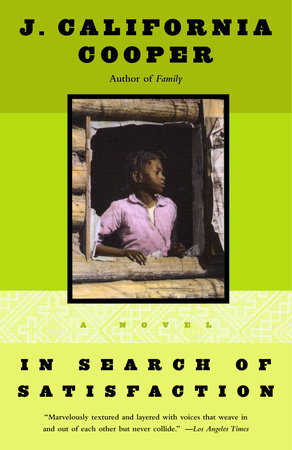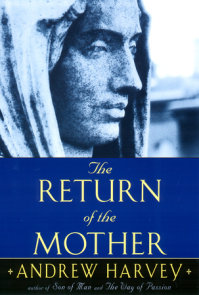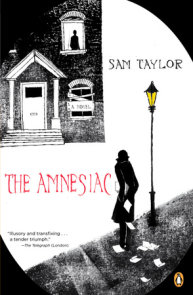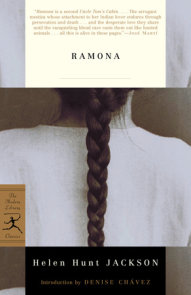READERS GUIDE
In her acclaimed novels and short stories, J. California Cooper portrays the lives of African Americans, bringing to light the impact of history, social and economic hardship, and enduring cultural strengths on the experiences of individuals and families. The questions, discussion topics, suggested reading list, and author biography that follow are designed to enhance your group’s discussion of her works, which range across time and place but share the passion, humor, and wisdom that mark J. California Cooper as one of the most original and engaging storytellers of our time.Introduction
Cooper blends the informal, conversational style of traditional folk narratives and a deep moral sensibility in the novel In Search of Satisfaction, a provocative and moving exploration of good and evil, need and desire. Set in Yoville, a town dominated by the rich and troubled Befoe family, it is a chronicle of three families over several generations. In the years following the Civil War, Josephus, a freed slave, fathers two daughters: Yinyang, born to his former owner who draws a reluctant Josephus into her bed; and Ruth, the child of an ex-slave. Yinyang journeys from Yoville to New Orleans and returns home well-schooled in the immoral ways of the city. Ruth marries and with her husband, Joel, builds a loving household for four children. When Ruth and Joel die within weeks of each other, their legacy of hard work and strong love sustains the children through years of poverty. As Yinyang, Ruth’s offspring, and the Befoes search for satisfaction–some heeding the word of God, others under the spell of Satan–their lives intertwine in surprising ways.Questions and Topics for Discussion
1. On the surface, Yoville is community of rigid hierarchies, with sharp divisions between rich and poor, black and white, the powerful and the powerless. What other differences among the members of the community emerge as the novel unfolds? For example, how do religious beliefs and a sense of moral values influence the characters’ approaches to life? How do cultural biases passed down from one generation to the next affect the way the characters interact? Which characters defy or overturn the patterns of their families, race, or class? Why are they able to do so?
2. How do the attitudes of Yinyang, Ruth, and Carlene towards men, sex, and money differ? In what ways do they overlap? Are their attitudes shaped by their personal circumstances, or do they reflect the realities of the time and place in which they live? Hosanna is clearly a victim of society’s mistreatment of women–especially women of color. Compare and contrast her experiences in the city with Yinyang’s. What insights do the choices Hosanna makes even as a young girl give you into her character, and how do they establish the path she follows as an adult? In many ways, the men–Josephus, Joel, Carl Befoe, and Richard Befoe–represent cultural archetypes. How does Cooper bring them to life as individuals? Is she entirely successful?
3. The pursuit of money and material goods and the search for emotional and spiritual satisfaction are the dominant themes of the novel. Are these two goals necessarily contradictory? What needs and desires, if any, do Carlene, Yinyang, Ruth, and Hosanna share?
4. As she weaves together the intricate plot lines of the novel, Cooper interjects commentary from Satan as well as passages reflecting on the morality of the characters’ actions. How does this unusual narrative technique affect your experience as a reader? Do these "asides" deepen your understanding of the characters and the themes of the novel, or do you find them unnecessary or intrusive?
5. What do Cooper’s novels share with other books, both fiction and nonfiction, that you have read about the Civil War period? Do her descriptions of the relationships between African Americans and whites before and immediately following the war differ from your previous impressions or beliefs? In what ways does Cooper challenge the traditional depiction of the boundaries between slave and master, black and white? Which characters or relationships do you find particularly surprising? Are the white characters as fully developed as the African Americans are?
6. Cooper touches on a wide range of social, economic, and political issues in her writing, including the historical divisions between races and classes; interracial relationships; the significance of complexion in society in general and within the African American community specifically; and the importance of education. What techniques does she use to incorporate these subjects without disrupting the flow of the stories? In what ways can fiction be more effective than nonfiction in revealing the forces that shape our world?
7. In describing Cooper’s writing, Alice Walker said, "Her style is deceptively simple and direct and the vale of tears in which her characters reside is never so deep that a rich chuckle at a foolish person’s foolishness cannot be heard." How do these traits mirror classic forms of storytelling, from myths and Biblical parables to the folk stories passed down through oral traditions? Why do you think Cooper may have chosen to use these timeless techniques to tell her stories?






















